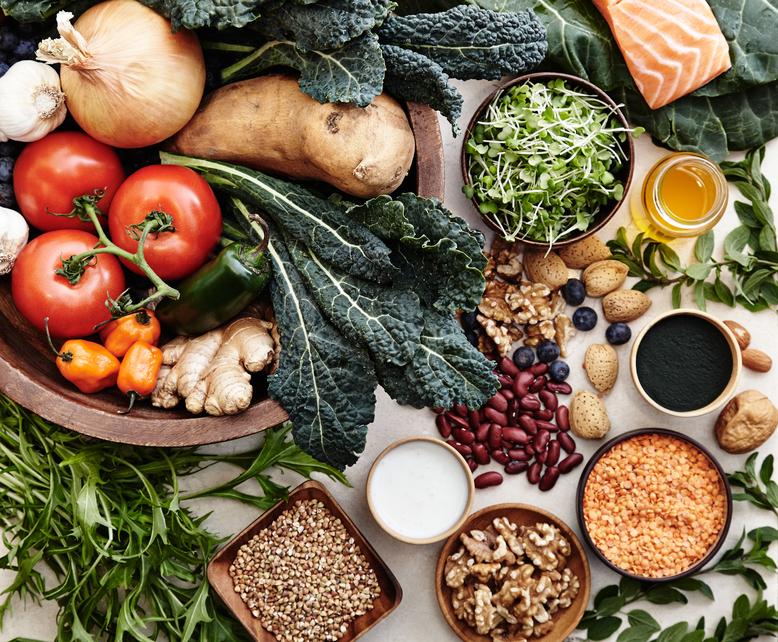By Sophie Geoffrion, Nutritionist and Co-Founder of HappyFitness
 It's an extraordinary thing, when you think about it. When you're pregnant, your body completely reorganizes itself to accommodate the new human being that is forming inside of you. Having a healthy diet and gaining enough weight are two factors that will ensure that your baby develops in healthy ways and that you remain in good health. To meet these two challenges and avoid pitfalls, follow the guidelines below and take inspiration from our tantalizing snack ideas to adapt your menu at each new trimester.
It's an extraordinary thing, when you think about it. When you're pregnant, your body completely reorganizes itself to accommodate the new human being that is forming inside of you. Having a healthy diet and gaining enough weight are two factors that will ensure that your baby develops in healthy ways and that you remain in good health. To meet these two challenges and avoid pitfalls, follow the guidelines below and take inspiration from our tantalizing snack ideas to adapt your menu at each new trimester.
What's the purpose of gaining weight?
Your entire body must adapt to promote your baby's growth in your belly. You gain weight during pregnancy due to the increased volume of different fluids (blood, extracellular fluid and amniotic fluid), the growth of maternal tissues (breast, uterus, placenta and adipose reserves) and—of course—the development of the fetus.
When we refer to “weight” in the paragraphs that follow, we are in no way commenting on the traditional female body shape. On the contrary, the goal of this article is to provide advice on the best pace to adopt when gaining weight during pregnancy, which indicates that the baby is growing happily and in good health.
Throughout the pregnancy
The amount of energy (calories) required during pregnancy vary from one woman to another and depend on the woman's basal metabolic rate, level of physical activity and current trimester. Unless a woman has persistent nausea, she will have a heightened appetite, which will cause her to eat more in order to meet the increased energy needs of the future baby that is developing inside of her. Drink enough fluids! Since your body is carrying 6 to 9 additional litres of water during pregnancy, you must drink a total of 2.3 litres of liquid every day to ensure that you remain sufficiently hydrated. You fibre needs will also increase slightly. To take advantage of fibre's benefits in regards to bowel regularity, your blood sugar level and feelings of satiety, it is a good idea to add pre-washed, unpeeled fruits and vegetables, whole grains and bran, beans, nuts and seeds to your diet. Omega-3s are looking out for your best interests. To promote the healthy development of your baby's brain and retina as well as your own cardiovascular health, consume 150g of cooked fish every week, such as salmon, sardines, canned light tuna, mackerel and herring. While most future mothers get enough protein, your needs will increase slightly between the first and second trimesters. When including protein sources in each meal, make sure you cover all of your bases, including meat, poultry, fish, eggs, yogurt, milk, cheese, beans, tofu, nuts and seeds. Pregnant women or those who plan to get pregnant are also advised to take a multivitamin every day that provides 400 μg of folic acid and between 16 and 20 mg of iron.First trimester
Regardless of your initial weight, gaining between 0.5 and 2 kg (1 to 5 lbs) is recommended during the first three months of pregnancy. Since this is a relatively small amount, you do not need to drastically change your diet. You must simply consume a wide variety of unprocessed foods from all four food groups: fruits and vegetables, grains, meat and alternatives, and milk and alternatives. During the second and third trimesters, a woman with a normal body weight* will generally gain a total of 25 to 35 pounds (11.5 to 16 kg), which corresponds to an average gain of 1 pound (420 g) per week until the baby is born. *A normal body weight corresponds to a BMI between 18.5 and 24.9 kg/m2. Women with a BMI lower than 18.5 (lean) will need to gain more weight, while women with a BMI of 25 or higher (overweight and obese) must ensure that they gain a bit less. You must follow your doctor's recommendations. To calculate your BMI : http://www.webmd.com/diet/body-bmi-calculatorSecond trimester
By adding one to three portions of the food group of your choice to your daily menu (for a total of 340 calories) throughout your third trimester, you will be on the right track to attain your weight objective. Healthy foods containing one or more of the following nutrients are excellent options: protein, fibre, Omega-3s, folic acid, vitamin D, calcium, vitamin C and vitamin B12. Here are three snack ideas that will boost your nutrient intake, amounting to 2 to 3 portions according to Canada's Food Guide, for a total of approximately 340 calories each:| Yogurt Parfait | Bagel with Salmon & Cream Cheese | Pita with Hummus, Sardines & Red Pepper |
| ¾ cup of plain Greek yogurt 1 tbsp. of maple syrup ½ cup of raspberries ¼ cup of All Bran Buds® cereal 2 tbsp. of plain sliced almonds | ½ whole wheat bagel, toasted 1 tbsp. light cream cheese Small can of pink salmon (106 g) Slice of tomato, lemon juice, red onions and capers | 1 whole wheat pita ⅓ cup of hummus ½ red pepper, sliced ½ can of sardines in oil, drained |
| Total: 335 calories | Total: 340 calories | Total: 347 calories |
Third trimester
During the third trimester, an extra 450 calories per day (in comparison to your pre-pregnancy needs) will be necessary in order to maintain the recommended rate of weight gain. This may seem enormous but, in reality, most women are more likely to gain “too much” weight than “not enough” during pregnancy. For inspiration, here are 3 snack ideas, each totalling approximately 225 calories. Add one per day, and you'll be golden!| Coffee Break | Small Asian Salad | Rice Crackers with Peanut Butter & Banana |
| 1 small, homemade blueberry and whole wheat muffin ½ cup of fresh strawberries 1 cup of decaffeinated coffee | 1 cup of chopped spinach (8) 1 clementine, quartered (35) ¼ cup of cooked edamame beans (67) 1 tbsp. of roasted cashews, chopped (50) 1 tbsp. of Wafu® Sesame Vinaigrette (70) | 2 plain brown rice crackers 1 tbsp. of natural peanut butter 1 medium banana Cinnamon, to taste |
| Total: 237 calories | Total: 230 calories | Total: 230 calories |
Sophie Geoffrion and Chloé Rochette, founders of HappyFitness

